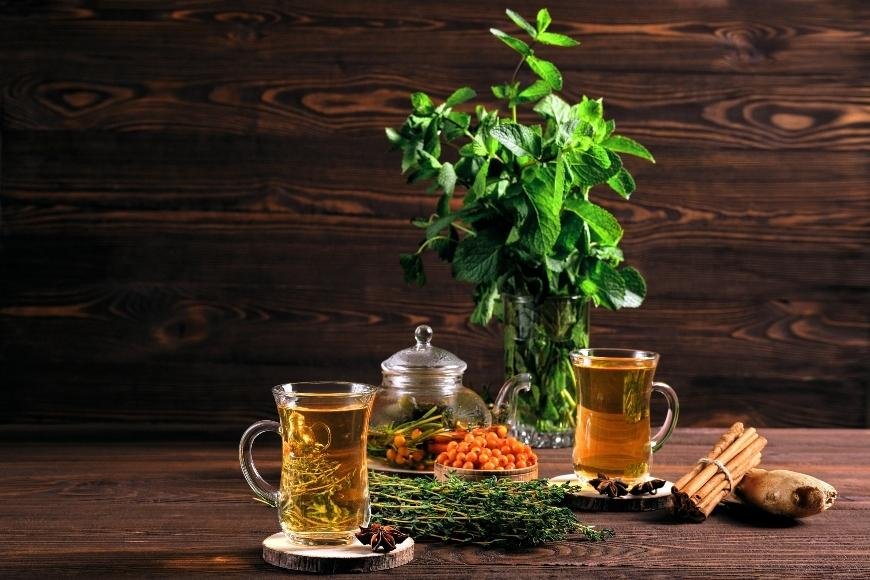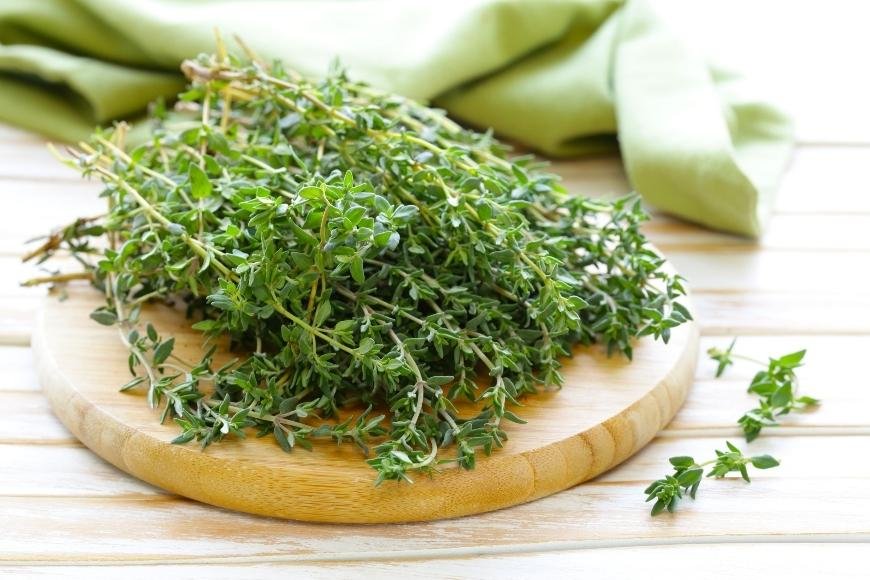What is Thyme?
This perennial herb, scientifically known as Thymus vulgaris, has a rich history and an array of uses that extend far beyond the culinary world.

What is Thyme? This perennial herb, scientifically known as Thymus vulgaris, has a rich history and an array of uses that extend far beyond the culinary world. As you delve into this fascinating plant, you'll discover its historical significance, various effects on the human body, and potential side effects.
In addition to exploring its safety profile, we will also uncover some modern applications of thyme in both traditional and unconventional settings. By understanding what is Thyme and its diverse properties, you can make informed decisions about incorporating it into your own lifestyle or perhaps even experimenting with it in new ways.
Table of Contents:
- What is Thyme?
- History of Thyme: Exploring the Ancient Uses
- Effects of Thyme
- Side Effects of Thyme
- Is Thyme Safe?
- Uses of Thyme in Modern Times
- Frequently Asked Questions What is Thyme
- Conclusion
What is Thyme?
Thyme, scientifically known as Thymus vulgaris, is a perennial herb belonging to the mint family. This highly esteemed herb has been valued for its culinary, medicinal, and decorative applications over the centuries. With over 350 species of thyme available worldwide, it's no wonder that this versatile herb has found its way into various cultures and traditions.
The leaves of thyme are small and green with a slightly fuzzy texture. The plant produces tiny purple or pink flowers that attract bees and other pollinators during the blooming season. Thyme can be grown both indoors and outdoors, making it an excellent choice for those who enjoy growing their own herbs at home.
Besides being used in cooking to add flavor to dishes like soups, stews, sauces or roasts - thyme also boasts numerous health benefits thanks to its active compounds such as thymol which possesses antiseptic properties. In fact, ancient Egyptians utilized thymol in their embalming process while Greeks burned bundles of dried thymes as incense in sacred temples.
History of Thyme: Exploring the Ancient Uses

Tracing its roots to ancient Egypt, Greece, and Rome, thyme has been a popular herb for millennia due to its versatile and aromatic qualities. Its rich history dates back to ancient Egypt, Greece, and Rome. Let's dive into some fascinating historical uses of thyme.
Ancient Egypt
In ancient Egyptian culture, thyme was valued for its antiseptic properties and was often used in embalming practices. Egyptians believed that preserving the body after death would ensure a successful journey to the afterlife. Thyme played an essential role in this process due to its ability to prevent decay and repel insects.
Ancient Greece
The Greeks also recognized thyme's medicinal qualities and utilized it as a remedy for respiratory issues like coughs or asthma. They even burned it as incense during religious ceremonies as they believed that its scent had purifying effects on both physical spaces and spiritual energy. Additionally, Greek soldiers were known to bathe in water infused with thyme before battles - not only did this provide them with courage but also helped heal their wounds more quickly thanks to its antibacterial properties.
Roman Empire
Roman civilization further expanded upon the many uses of thyme; Romans enjoyed adding it as a flavor enhancer in food dishes while appreciating its medicinal benefits too. It is said that Roman soldiers carried sprigs of fresh thyme with them on long journeys - chewing on these leaves provided relief from fatigue while keeping their breath fresh at all times.
Medieval Europe
In medieval times, thyme was believed to possess magical properties that could protect against evil spirits and even bring good luck. People would often hang bundles of the herb in their homes or wear it as an amulet for protection. During medieval times, thyme was utilized medicinally by European herbalists to help with a range of issues including digestive difficulties, skin disorders and respiratory troubles.
As we can see from its rich history across various cultures, thyme has been revered not only for its culinary applications but also for its medicinal benefits and spiritual significance. Today, many people continue to explore the diverse uses of this versatile herb in both traditional remedies and modern-day practices.
Effects of Thyme
Understanding the impact of thyme on our bodies and minds can be quite fascinating, especially when considering its various uses throughout history. This versatile herb not only adds flavor to our dishes but also offers numerous health benefits.
Mood Enhancement
Thyme holds carvacrol, a substance that has been observed to possess the capability of enhancing one's disposition. Carvacrol's ability to boost dopamine and serotonin levels in the brain has been shown to have a positive effect on mood and wellbeing.
Cognitive Benefits
Antioxidants present in thyme may be beneficial for cognitive functioning, potentially shielding brain cells from free radical harm. Thyme's flavonoids such as apigenin and luteolin are thought to enhance memory and learning. Check out this study for more information on how these compounds positively affect cognition.
Aiding Digestion
- Antispasmodic Properties: Thymol, one of the main components found in thyme oil, is known for its antispasmodic effects. It helps relax intestinal muscles and alleviate symptoms such as bloating or cramping associated with digestive issues.
- Promoting Healthy Gut Bacteria: The volatile oils present in thyme possess antimicrobial properties that aid digestion by promoting healthy gut bacteria while inhibiting harmful ones.
- Easing Indigestion: Traditionally used as a remedy for indigestion, thyme can help stimulate the production of gastric juices and bile, which in turn aids digestion.
Respiratory Health
Thyme has long been used as a natural remedy for respiratory issues due to its antiviral, antibacterial, and expectorant properties. It helps soothe coughs and sore throats while also promoting the expulsion of mucus from the lungs. A study conducted on patients with acute bronchitis found that an extract made from thyme was effective in reducing symptoms such as coughing and shortness of breath.
Skin Care Benefits
The antimicrobial properties present in thyme make it an excellent ingredient for skin care products targeting acne-prone or oily skin types. Thymol is known to be effective against bacteria responsible for causing acne breakouts while also helping reduce inflammation associated with these conditions. Moreover, thyme's antioxidant content helps protect our skin cells from damage caused by environmental stressors like pollution or UV radiation.
Thyme may lead to sensations ranging from gentle relaxation to heightened vigor and concentration. It is important to understand the potential side effects of thyme before using it for recreational or medicinal purposes.
Side Effects of Thyme
Although usually thought to be safe, it's important to recognize the potential side effects and dangers related to thyme consumption. In this part, we'll go over some of the potential issues and safety measures to consider when utilizing thyme.
Allergic Reactions
Some individuals may experience an allergic reaction to thyme. Symptoms can range from mild skin irritation or rash to more severe reactions such as difficulty breathing or swelling in the face, lips, tongue, or throat. If you suspect that you're allergic to thyme or any other herbs in the mint family (such as oregano), it's best to avoid consuming them and consult a healthcare professional for advice.
Pregnancy and Breastfeeding Concerns
Pregnant women are advised against consuming large amounts of thyme due to its potential uterine-stimulating properties. While moderate intake through food is typically considered safe during pregnancy, taking concentrated supplements or excessive quantities could potentially lead to complications. Similarly, breastfeeding mothers should exercise caution when using thyme-based products since there isn't enough reliable information about their safety during lactation.
Drug Interactions
Thyme may interact with certain medications, particularly those that slow blood clotting (such as anticoagulants and antiplatelet drugs). Combining these medications with thyme could potentially increase the risk of bruising or bleeding. Consult your doctor prior to using thyme if you are on any prescription medications, as there may be potential interactions.
In summary, while most people can safely enjoy the benefits of thyme without experiencing side effects, it's essential to be aware of potential risks and interactions associated with this herb. It is imperative to speak with a healthcare professional before using thyme if there are any worries about its effects on health or potential interactions with other medications.
The side effects of thyme should be considered before using it as a medicinal or recreational substance. However, with the proper precautions and knowledge, one can determine if thyme is safe for them to use. Is Thyme Safe? Investigating the implications of thyme as a dietary supplement, scientific research has provided us with further insight.
Is Thyme Safe?

When considering the safety of thyme, it is important to take into account various factors. Generally speaking, thyme is considered safe for most people when consumed in moderate amounts as part of a balanced diet or used topically in small quantities. However, some individuals may experience adverse reactions or side effects.
Allergies and Sensitivities
Some people may be allergic or sensitive to thyme. If you have an allergy to plants from the Lamiaceae family (such as mint), you might also react negatively to thyme. Symptoms of a potential reaction to thyme may include itching, swelling, skin irritation and difficulty breathing. In case of any such symptoms after consuming or using thyme products seek medical attention immediately.
Pregnancy and Breastfeeding
Pregnant women should exercise caution with their consumption of large amounts of thyme due its potential uterine-stimulating properties which could lead to complications during pregnancy.
Drug Interactions
If you're on medication that affects blood clotting (like anticoagulants) or thyroid function (like levothyroxine), it's important that you consult your doctor before incorporating significant amounts of thyme into your diet since it could potentially interact with these medications causing unwanted side effects.
Thyme Oil Safety
When it comes to thyme essential oil, safety is crucial. Undiluted thyme oil can cause skin irritation and should always be diluted with a carrier oil before applying topically. Moreover, consumption of undiluted thyme oil can lead to serious health issues and should be avoided. Always follow the manufacturer's instructions for proper use and dosage when using any form of thyme essential oil.
In summary, while thyme is generally safe for most people in moderate amounts or topical applications, certain individuals may experience adverse reactions or need to exercise caution due to specific circumstances like pregnancy or medication interactions. As always, consult your healthcare provider if you have concerns about incorporating this versatile herb into your life.
Uses of Thyme in Modern Times
Thyme has progressed significantly since its old beginnings, and today it is employed for a range of objectives. From culinary applications to medicinal uses, this versatile herb has found its place in modern society. Let's explore some of the most popular ways thyme is utilized today.
Culinary Uses
In the kitchen, thyme serves as a staple ingredient in many dishes due to its unique flavor profile. Thyme can be utilized fresh or dried to enhance soups, stews, sauces and meat dishes with its distinctive flavor. One particularly famous use of thyme is in Herbes de Provence, a classic French blend of herbs that includes rosemary, marjoram, oregano, and lavender.
Medicinal Benefits
Beyond its culinary appeal lies an array of potential health benefits attributed to thyme's natural compounds like thymol. This substance possesses antiseptic properties which make it useful for treating minor cuts and wounds when applied topically. Additionally, research suggests that consuming thyme may help with respiratory issues such as bronchitis or asthma by relaxing airway muscles (source). Some people also turn to thyme tea as a remedy for digestive problems like indigestion or bloating.
Aromatherapy Applications
The essential oil derived from Thymus vulgaris boasts numerous therapeutic qualities that have made it popular within aromatherapy circles. When diffused into the air or added to bathwater (diluted), thyme essential oil is believed to help with relaxation, stress relief, and even boosting the immune system. When using essential oils, it's important to be aware of their potency and dilute them before topical application.
Gardening
Thyme also plays a role in modern gardening practices as an attractive ground cover or border plant. Its low-growing habit and fragrant foliage make it ideal for rock gardens or pathways where its scent can be enjoyed by passersby. Additionally, thyme plants are known to attract pollinators like bees and butterflies which contribute positively to overall garden health.
Pest Control
An interesting use of thyme in modern times is as a natural pest deterrent. Thymol found within the herb has been shown to repel certain insects such as mosquitoes (source). This makes planting thyme around outdoor seating areas or incorporating it into homemade insect repellents a popular choice among eco-conscious individuals looking for non-toxic alternatives.
Frequently Asked Questions What is Thyme
What is special about thyme?
Thyme is a versatile herb with numerous benefits. It has strong antimicrobial, antiviral, and antioxidant properties due to its high content of thymol. Thyme can be used in cooking for flavor enhancement, as well as for medicinal purposes such as treating respiratory issues and boosting the immune system.
What is thyme explained?
Thyme (Thymus vulgaris) is an aromatic perennial herb belonging to the mint family. Native to the Mediterranean region, it's widely cultivated worldwide for its culinary uses and essential oil production. The leaves are small and greenish-gray with a pleasant aroma that adds depth to various dishes while also offering health benefits.
What are three facts about thyme?
- Thyme contains compounds like carvacrol and thymol which possess potent antimicrobial properties.
- Ancient Egyptians used thyme in their embalming process due to its preservative qualities.
- Besides culinary applications, it's commonly found in natural remedies, perfumes, soaps, and cosmetics thanks to its fragrance and therapeutic effects.
What is the history and facts about thyme?
The use of thyme dates back over thousands of years across different civilizations. Ancient Egyptians utilized it during mummification; Greeks considered it a symbol of courage; Romans believed it promoted vigor when consumed regularly. In medieval Europe, people placed sprigs under pillows for protection against nightmares or brewed into teas for medicinal purposes.Learn more here.
Conclusion
For centuries, thyme has been employed for culinary, medicinal and ceremonial purposes. It's effects can range from calming to energizing depending on how it is consumed. Though no major adverse reactions are known, caution should be taken when using thyme as it could lead to overdose or have a negative reaction with other substances. With careful research and understanding of proper dosage, however, thyme may offer many beneficial uses both physically and spiritually when taken responsibly.
Discover the latest news and information about cannabis, magic mushrooms, psychedelics and other substances on Azarius. Join us today to stay informed and find solutions for your needs!






































































































































